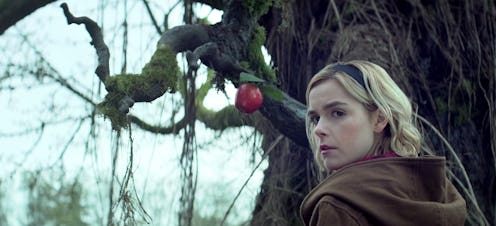Entertainment
How 'Chilling Adventures Of Sabrina' Uses Magic As A Metaphor For The Patriarchy

For as much as the last year has empowered women, existing in a patriarchal society means that, sometimes, you're forced to fight with the system, not against it. As such, we have to face a choice each day: Do we push back, consequences be damned? Or do we work silently, put aside the microagressions, and challenge things from the inside? In Chilling Adventures Of Sabrina, half-witch, half-mortal teen Sabrina faces a literal interpretation of this struggle. If she chooses magic, she'll be granted immeasurable power at the cost of her own agency; if she rejects it, she'll have freedom, but be doomed to a life of perpetual conflict, confronting a system that has, historically and intrinsically, always had the upper hand.
It's a decision Sabrina wrestles with throughout the entirety of Chilling Adventures Season 1. On the the eve of her 16th birthday, she's about to sign herself over to the Dark Lord and become a full-blown witch when suddenly, something within her balks. She runs away, deciding she'll just continue straddling her two worlds, but this is not the plan Satan — or society — has in mind for her. Over the course of the show it becomes clear that the Church of Night is essentially an elite boys' club masquerading as religion. Father Blackwood, its high priest, tries to assure Sabrina that pledging her soul to the devil doesn't eradicate free-will; she can opt out of the deal at any time. Of course, none of this is true — once you're in, you’re in, even once you reach the afterlife.
Sabrina is simultaneously captivated and horrified by this prospect. She seems good at heart, but a part of her revels in the darkness of the church. After a group of lug-headed football jocks torture her friend Susie, she enlists fellow witches the Weird Sisters to help exact revenge. She enjoys this bit of evil, and after the deed is done, she admits she wishes there were a way for her to have power without the strings that come along with it. “He’ll never give you that, the Dark Lord," one of the sisters, Prudence, explains. "The thought of you, of any of us having both terrifies him."
When Sabrina asks why, Prudence responds simply: “He’s a man, isn’t he?”
The Dark Lord, much like many of the men atop our current power structures, understands that women are capable of much more than the glass ceiling has allowed them to be. But it is precisely that awareness that emboldens him. He knows that women won't just blindly follow him, so instead he proposes an exchange: he'll give them a seat at the table, but only if they relinquish at least some of their control. For the Weird Sisters, it's a fair deal — they'd rather have regulated power than nothing at all — but for Sabrina, it's more conflicting.
Ultimately, she does sign the Book of the Beast, partially because she's tempted, but primarily because Ms. Wardwell manipulates her into thinking it's the only way to save the people she loves the most. It's discouraging that Sabrina, a clearly strong-minded, independent young woman, is broken into believing the only way forward is to sacrifice some part of herself, but that's often the case in real-life, too — like when you have to roll your eyes at your misogynistic boss because losing your job isn't worth standing up for yourself in that one moment, or when victims of workplace assault must choose between their livelihoods and their careers.
Of course, in real life we don't get to decide whether or not we want to submit to the patriarchy; that system is already in place no matter how much we may try to resist it. But we can choose how we want to approach it. Are we the Weird Sisters? Sabrina? Some combination of both? Chilling Adventures doesn't make any presumptions about which is the right — or most effective — path, and as with anything, there are pros and cons to both. But it does highlight the ways that men — whether well-meaning or, in this case, malicious — can undermine women even as they are empowering them. Sabrina knows this, and though she may have resigned herself to fighting from within the system, it's clear she's only just begun to unlock the true potential of her power. And so have we.